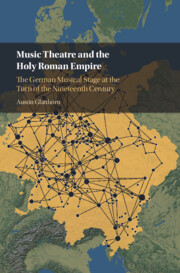 Music Theatre and the Holy Roman Empire
Music Theatre and the Holy Roman Empire Book contents
- Music Theatre and the Holy Roman Empire
- Music Theatre and the Holy Roman Empire
- Copyright page
- Dedication
- Contents
- Figures
- Tables
- Musical Examples
- Acknowledgements
- Note on the Text
- Abbreviations
- Introduction: Music for an Imperial Stage
- 1 An Empire of Theatres
- 2 (In)forming Repertoire
- 3 Letters from the German Stage
- 4 ‘Germany’s Daughter, Melodrama’
- 5 Staging Imperial Identity
- Epilogue: Echoes of an Empire
- Appendix 1: German Theatre Companies and Performance Locations Reported in the Theater-Kalender, c.1800
- Appendix 2: Music Theatre and Musicians Referenced in the Theater-Kalender, c.1800
- Glossary
- Bibliography
- Index
3 - Letters from the German Stage
Published online by Cambridge University Press: 14 June 2022
- Music Theatre and the Holy Roman Empire
- Music Theatre and the Holy Roman Empire
- Copyright page
- Dedication
- Contents
- Figures
- Tables
- Musical Examples
- Acknowledgements
- Note on the Text
- Abbreviations
- Introduction: Music for an Imperial Stage
- 1 An Empire of Theatres
- 2 (In)forming Repertoire
- 3 Letters from the German Stage
- 4 ‘Germany’s Daughter, Melodrama’
- 5 Staging Imperial Identity
- Epilogue: Echoes of an Empire
- Appendix 1: German Theatre Companies and Performance Locations Reported in the Theater-Kalender, c.1800
- Appendix 2: Music Theatre and Musicians Referenced in the Theater-Kalender, c.1800
- Glossary
- Bibliography
- Index
Summary
This central chapter turns to written communication to explore its part in regulating and networking theatres and repertoire. It begins with an exploration of the types of information shared between troupes and how discursive networks supported their performances. Although theatres are commonly portrayed as having to compete to survive, this chapter reveals that they also regularly cooperated. By illustrating the equal importance of discursive networks and material exchange among the Großmann (touring), Mainz (ecclesiastical court-affiliated), and Schwerin theatres (secular court-affiliated), it reveals that theatre companies were designed with both court and public audiences in mind, and in practice cultivated a shared repertoire. Programming choices were made to some degree based on location, the status of audiences, tastes of patrons, and access to performance materials. But this chapter argues that such decisions were usually owing to the intense communication of theatrical information and recommendations between theatre directors and enthusiasts – and, ultimately, on the expectations to which a collective imperial culture gave rise.
Keywords
- Type
- Chapter
- Information
- Music Theatre and the Holy Roman EmpireThe German Musical Stage at the Turn of the Nineteenth Century, pp. 126 - 169Publisher: Cambridge University PressPrint publication year: 2022
